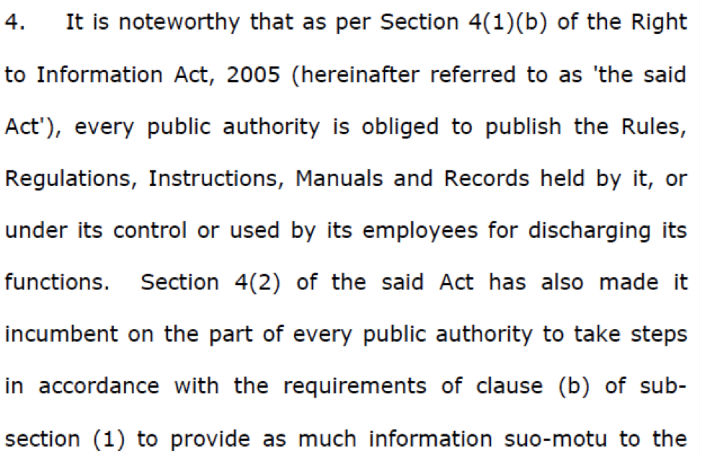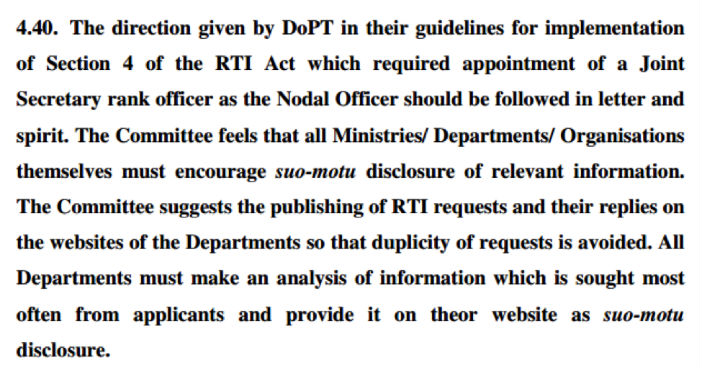[orc]In a bizarre turn of events, the Jaipur Bench of the Rajasthan High Court directed the government to proactive disclose all the rules within 4 months. The HC directions were part of a suo motu PIL, necessitated by the fact that the HC could not find a copy of the rules it had to refer to in another writ petition. The HC referred to Section 4 of the RTI act and how proactive disclosure is already mandated under the act.
In what could be termed as a bizarre turn of events, the Jaipur bench of the Rajasthan High Court recently directed the Rajasthan Government to ensure that the Rules framed by the Rajasthan Government should be uploaded on the website of the State of Rajasthan or the concerned department within a period of four months. It was bizarre because the HC took notice of this issue Suo Motu, after it could not find a copy of Rajasthan Evaluation Service Rules, 1979 in the court library.
The Background
While hearing the WP No.8381/2014, the HC had to refer to the Rajasthan Evaluation Service Rules, 1979 which were not available in the library of the Court. The counsel for the parties also informed the court that copy of these Rules is neither available in the open market nor has been uploaded on the website of the concerned department. The Court had also recorded that in other cases as well, the statutory Rules framed by the Governor of Rajasthan for other departments of the Government and public authorities were also neither available in the open market nor on the website of the concerned departments or public authorities.
The Court was also been informed that some of these Rules were not even published in official gazette or any other publication making it impossible for the public to get copy of such Rules.
Proactive Disclosure under the RTI Act
The HC referred to Section 4(1)(b)(v) of the RTI act that mandates, rules, regulations, instructions, manuals and records, held by it or under its control or used by its employees for discharging its functions be proactively disclosed by the government.
In fact, Section 4 of the RTI act puts the onus on every public authority to proactively (Suo Motu) disclose a host of information. Section 4(1)(b) of the RTI act refers to 17 items that are to be proactively disclosed by the authorities and to be regularly updated.
Some of the 17 items include
- The particulars of the organisation, functions and duties;
- The powers and duties of officers and employees;
- The procedure followed in the decision making process, including channels of supervision and accountability;
- The norms set by it for the discharge of its functions;
- The rules, regulations, instructions, manuals and records, held by it or under its control or used by its employees for discharging its functions;
- The particulars of any arrangement that exists for consultation with, or representation by, the members of the public in relation to the formulation of its policy or implementation thereof;
- A directory of the officers and employees;
- Monthly remuneration received by each of its officers and employees, including the system of compensation as provided in its regulations;
- Budget allocated to each of its agency, indicating the particulars of all plans, proposed expenditures and reports on disbursements made;
- The manner of execution of subsidy programmes, including the amounts allocated and the details of beneficiaries of such programmes;
Apart from these, the authorities are also supposed to publish all relevant facts while formulating important policies or announcing the decisions which affect public. They are also supposed to provide reasons for administrative or quasi-judicial decisions to affected persons.
All this was supposed to be done within 120 days of the enactment of the RTI act in 2005 and regularly updated.
What is the status of implementation?
10 years on, there has been very little progress on the proactive disclosure front. So much so, that even the Prime Minister’s Office has not published the proactive disclosures under Section 4. The Department of Personnel & Training (DoPT), which is the nodal ministry for implementation of the RTI act, has been issuing guidelines after guidelines, but without much avail.
The DoPT recently issued a circular referring to the 76th Report of the Department Related Parliamentary Standing Committee on Personnel, Public Grievances, Law and Justice’s recommendation regarding suo-motu disclosure under Section 4 of the RTI act.
Even the two member panel of former Central Information Commissioners recommended greater transparency and the strict implementation of Section 4. Will the government take this seriously this time around? Only time will tell.




